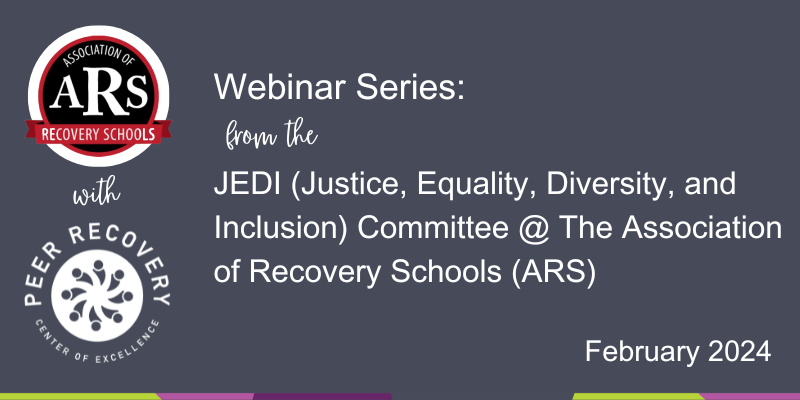The Association for Recovery Schools (ARS), in partnership with the Peer Recovery Center of Excellence, present this webinar series. This series, developed by the ARS Committee for Justice, Equity, Diversity, and Inclusion (JEDI), will focus on the topics below within the context of secondary education, with a particular focus on recovery high schools. Each webinar will feature a subject matter expert as well as the co-chairs of the JEDI committee; Ahmed Hosni and Morgan Thompson.
Webinar I
Building Resilience: Navigating ACES and Social Determinants of Health in High Schools
 This webinar will focus on Adverse Childhood Experiences (ACES) and Social Determinants of Health (SDOH) for Youth with Substance Use. Attendees will be encouraged to consider practical application of the material covered in the recovery high school environment. The presentation will include time for Q & A.
This webinar will focus on Adverse Childhood Experiences (ACES) and Social Determinants of Health (SDOH) for Youth with Substance Use. Attendees will be encouraged to consider practical application of the material covered in the recovery high school environment. The presentation will include time for Q & A.
Our Presenter: Roy Wade, PhD
Click here for Dr. Wade’s bio
Objectives:
- Participants will gain an understanding of the ways in which ACEs affect the onset, trajectory, and prognosis of substance use and co-occurring disorders for adolescents. They will be able to define key concepts related to ACES.
- Participants will gain an understanding of the ways in which SDOH affect the onset, trajectory, and prognosis of substance use and co-occurring disorders for adolescents. They will be able to define key concepts related to SDOH.
- Through a Q&A style interview with the keynote speaker and facilitated breakout discussions, participants will gain an understanding of how to structure recovery high school programs to respond effectively to the impact of ACES and SDOH on students and their families. By the end of the workshop, participants should be able to outline one actionable step they can take immediately and identify at least one area where they need further training or resources.
[button link=”https://vimeo.com/910876079?share=copy” type=”big” color=”red”] WATCH HERE[/button]
Webinar II
Equity-Centered Academics in Secondary Education
Monday, March 18, 2024 ~ 2pm – 3:30pm ET (Rescheduled from February 12)
(1pm Central / 12pm Mountain / 11am Pacific)
 This webinar will focus the topics of equity-centered and trauma-informed education. The presentation will include general principles of equity in academic environments, specific considerations for recovery high school students, and evaluating the effectiveness of strategies implemented. Attendees will be encouraged to consider practical application of the material covered in the recovery high school environment.
This webinar will focus the topics of equity-centered and trauma-informed education. The presentation will include general principles of equity in academic environments, specific considerations for recovery high school students, and evaluating the effectiveness of strategies implemented. Attendees will be encouraged to consider practical application of the material covered in the recovery high school environment.
Our Presenter: Alex Shevrin Venet
Click here for Ms. Shevrin Venet’s bio
Objectives:
- Participants will delve into the fundamental equity principles and concepts crucial for academic planning within the unique context of a recovery high school. The exploration will extend beyond surface-level awareness, empowering professionals to identify and dismantle systemic barriers that may disproportionately affect students in recovery. By the end of the presentation, participants will have developed the skills to seamlessly integrate diverse perspectives and experiences into their academic curriculum, fostering inclusivity and relevance for every student.
- Participants will learn to apply inclusive teaching methods tailored to accommodate diverse learning styles and address individual needs. This objective emphasizes the practical application of strategies to create a classroom environment that is both inclusive and supportive, fostering a sense of belonging for all students. Professionals will leave equipped with techniques for adapting lesson plans to the unique circumstances and challenges faced by students at various stages of their recovery journey.
- Participants will gain parameters for establishing measurable benchmarks that reflect equity and inclusivity goals in academic services. Participants will learn to utilize assessment tools to pinpoint disparities in academic achievement among diverse student groups. The emphasis here is on implementing continuous improvement strategies, driven by data-driven insights, to refine academic services for greater equity. Professionals will leave equipped to ensure that outcomes align with the overarching goal of fostering an environment where every student can thrive in their educational and recovery journeys.
Past seminar video not available.
Webinar III
Restorative Practices in Recovery High Schools
Tuesday, February 27, 2024 ~ 2pm – 3:30pm ET
(1pm Central / 12pm Mountain / 11am Pacific)
 This webinar will focus on reviewing national research and best practices surrounding restorative justice. Attendees will be encouraged to consider practical application of the material covered in the recovery high school environment. This webinar will also feature a panel of subject matter experts.
This webinar will focus on reviewing national research and best practices surrounding restorative justice. Attendees will be encouraged to consider practical application of the material covered in the recovery high school environment. This webinar will also feature a panel of subject matter experts.
Our Presenter: Sarah Klevan, PhD, MSEd
Click here for Dr. Klevan’s bio
Objectives:
- During this session, participants will gain a comprehensive understanding of the fundamental principles and concepts associated with restorative practices and justice within the recovery high school setting. Emphasis will be placed on the core philosophy and how it can be effectively applied to build and repair student relationships within and outside of the school community. By the end of this presentation, participants will be equipped to articulate the foundational principles and their relevance to fostering a culture of restoration.
- Participants will focus on the practical application of restorative practices in academic settings within recovery high schools. Participants will learn how to utilize restorative approaches to address conflicts, build positive relationships, and create an environment conducive to both academic and personal growth. Strategies for incorporating restorative dialogue into academic settings and resolving conflicts will be explored, allowing professionals to foster a supportive and collaborative learning atmosphere.
- Participants will explore the integration of restorative justice principles into the planning and delivery of recovery support services. This objective aims to empower professionals to design programs that prioritize healing, accountability, and community building. Through interactive discussions and case studies, participants will develop the skills to create a restorative framework within recovery support services, promoting a sense of community and shared responsibility.
- Participants will learn how to assess and measure the impact of restorative practices and justice on the overall school culture. This includes evaluating changes in student behavior, relationships, and the overall atmosphere within the recovery high school. Professionals will be equipped with tools to collect and analyze data, enabling them to make informed decisions about the ongoing implementation and refinement of restorative practices to create a transformative and inclusive recovery-focused school environment.
[button link=”https://vimeo.com/917973174″ type=”big” color=”red”] WATCH HERE[/button] [button link=”https://recoveryschools.org/wp-content/uploads/2024/02/Recovery-Schools-2-27-2024.pptx” type=”big” color=”red”] DOWNLOAD PRESENTATION[/button]


